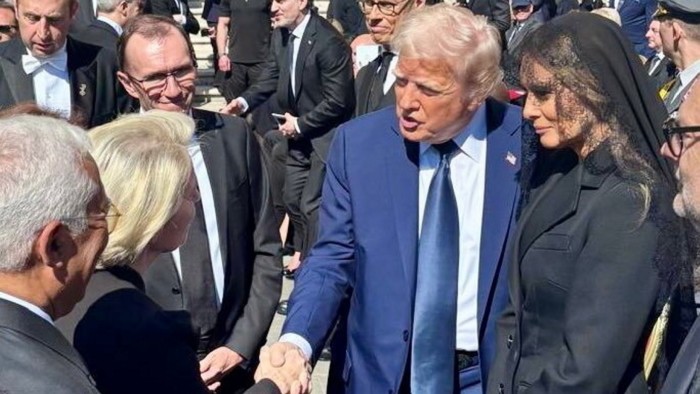Unlock the White House Watch newsletter for free
Your guide to what Trump’s second term means for Washington, business and the world
The writer is editorial director and a columnist at Le Monde
Popes’ funerals can produce miracles. First came the picture of Presidents Donald Trump and Volodymyr Zelenskyy engaged in a brief one-on-one dialogue in St Peter’s basilica. Less celebrated but just as revealing was a fleeting meeting caught by video above the crowd of VIPs attending that provided a perfect reflection of the transatlantic relationship in the age of Trump. The American president was seen politely shaking hands and exchanging a few words with Ursula von der Leyen, president of the European Commission. That was short but they will meet again, promised the commission.
The fact that an eight-second encounter could be seen as an achievement demonstrates Europe’s newfound solitude.
Attacked by its big, vengeful neighbour to the east, Europe now finds itself betrayed by its most important ally to the west. The brutal assault on Zelenskyy in the Oval Office on February 28 was a turning point; each European national leader visiting the White House to meet “the new sheriff in town”, as vice-president JD Vance put it at the Munich Security Conference, is now presented with the challenge of an unpredictable media circus.
But von der Leyen has not even had the chance to get anywhere near the Oval Office. Nor has Kaja Kallas, the EU’s high representative for foreign policy, been invited to the state department by secretary of state Marco Rubio when she visited Washington. Appalled by the treatment of Zelenskyy in Washington, she has declared that “the free world needs a new leader” and that it is up to Europeans to take up the role.
Von der Leyen appears to agree. In an interview with the German newspaper Die Zeit on April 15, she said that while she disliked “these labels”, “the west as we knew it no longer exists”.
Trump’s apparent realignment with Russia certainly poses a strategic challenge to Europe. Moscow’s aggression towards the rest of the continent has reached levels comparable to those of the cold war. But there is one big difference: this time, it is unclear to Europeans whether they can count on the support of the US.
Crimea may soon provide the ultimate test: should the US recognise de jure the annexation of the peninsula by Russia, as proposed by the delegation led by special envoy Steve Witkoff, Europeans may find themselves having to either abandon a fundamental pillar of post-second world war European security, namely territorial integrity and inviolability of borders, or make a clean break with their long-standing, major ally.
How could European nations and the US co-operate in a joint defence alliance, Nato, if they disagree on such basic principles?
As if strategic solitude was not enough of a disruption, Europe’s solitude is also ideological. The assault on democratic norms led with astonishing speed by the Trump administration is seen on this side of the Atlantic as aiming for a totally different political project than the one built by the EU and its democracies. If Trumpism succeeds in reinforcing homegrown nationalist and populist movements, in a world leaning towards autocracy, it may even threaten the European model of democracy.
Yet if Europe is alone, it is also larger than it has ever been since the second world war. Ten states sit in the waiting room of the EU. Nato has two new members, Finland and Sweden, very much committed to the defence of Europe. The UK is closely working with France on the support of Ukraine while Norway and Turkey, non-EU members, are also playing crucial roles.
In concentric circles, the Nordic-Baltic states, the “E3” (UK, Germany, France), the “E5” (UK, Germany, France, Italy, Poland), a “coalition of the willing” and various other configurations deploy tremendous diplomatic and political activity beyond the EU’s cumbersome machinery to advance European goals.
The debate on the uncertain future of Nato now focuses on building its European pillar, with most countries finally getting serious on military spending and fortifying the bloc. A conversation on a possible extension of French and British nuclear deterrence forces to Europe, anathema two years ago, has started. Staunch Atlanticists now preach the European gospel. “Europe is the last exit in the Transatlantic crisis and Friedrich Merz seems ready to take it,” says Thomas Kleine-Brockhoff, head of German foreign policy think-tank DGAP, about the soon-to-be chancellor of Germany.
Europe has a chance to make its current solitude into a strength. Naively believing that Trump will turn more reasonable because of low polls and economic setbacks would risk wasting this opportunity. Preparing for the worst is a safer bet than hoping for the best.
Source link









